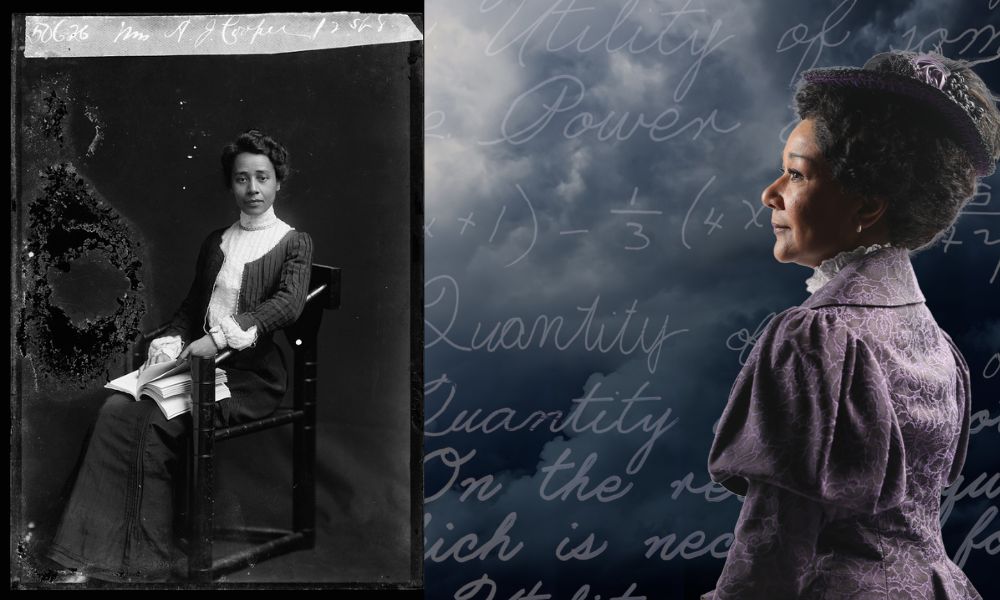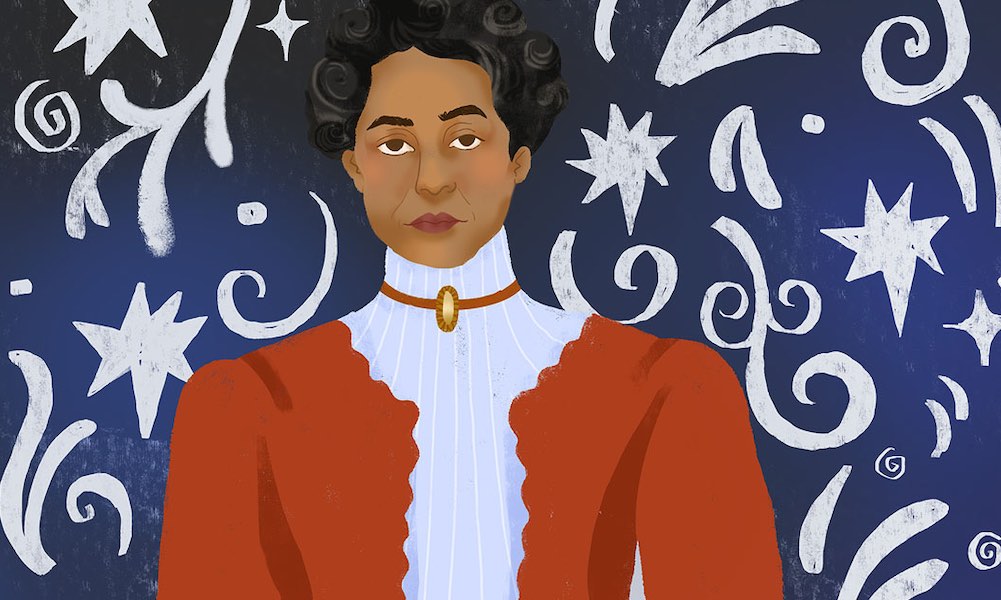When the lights are dimmed at the world premiere of Tempestuous Elements at Arena Stage this month, theater lovers, feminists, and historians will rejoice.
That’s because the play—commissioned by Arena as the 11th in its series of Power Plays—succeeds in rescuing a powerful woman, known today as the Mother of Black Feminism, from the obscurity to which women, and especially women of color, were often assigned.
The woman in question is Anna Julia Cooper, the brilliant, beautiful, and ultimately powerful protagonist at the heart of Tempestuous Elements.
One of the world’s first Black feminists, Cooper was born into slavery, but went on to earn degrees at Oberlin College, Columbia University, and the Sorbonne. Most critically, she was a pioneer in the struggle to bring higher education to Black children, here in DC, who had been long denied it.
Directing the play—and drawing on a wealth of theater techniques to tell the tale of the battle that ensued—is Psalmayene 24.
Psalm, as he likes to be called (his real name is Gregory Morrison), is a Helen Hayes Award–winning director who is also a prolific playwright, actor, choreographer, filmmaker, and pioneer in children’s theater. I talked to him in a Zoom interview, conducted during the final days of rehearsal prior to opening.
The last time we spoke, I reminded him, was two years ago, when he was starring in Dear Mapel, his own play about the father who disappeared from his life.
Like Mapel, Cooper was a real-life character defined by her absence, though she—unlike Mapel—occupied center stage at a critical point in Black history.

“Why should audiences care about Cooper now?” I asked.
The response from Psalm was immediate and emphatic.
“This play has a particular resonance today,” he said. “It’s reflected in the banning of books. In the forced resignation of Claudine Gay from her role as president at Harvard. In the controversy over critical race theory.
“Moreover, it’s both a framework and a lens for viewing major issues today. It shines a light on the Black experience, and it reminds us of how easily we forget those, like Cooper, who made a difference.”
And what a difference it was.

Although Cooper lived a remarkably long life—from 1858 to 1964—Tempestuous Elements is focused on her tumultuous years as principal of the M Street School, the first Black public high school in DC and one of the first in the U.S. (She also taught Latin there for 40 years, before and after she was principal.)
The play focuses on Cooper’s fight with the Board of Education, where the higher-ups, mostly white men, wanted to change the school from its rigorous college-bound approach to a vocational model. The latter was considered—even by Black leaders, such as Booker T. Washington—to be more suitable for the “colored.”
A different leader—none other than W. E. B. Du Bois, the eminent historian and early civil rights activist—championed Cooper’s approach and backed up her fight to bring a classical education to the otherwise disenfranchised.
“Readers will have to attend the show in order to find out how the fight ended,” Psalm quipped. Both men are brought to life—along with their contemporaries—in the play.
“Cooper is considered ‘the Mother of Black Feminism,’ a ‘proto-intersectionalist,’” he added. “That means that she was part of the vanguard of people grappling with and writing about the dual—and sometimes contradictory—experience of being both Black and a woman.”
The playwright, Kia Corthron, is “brilliant,” he continued. “The way she uses language is potent. Her work is fused with her heart. Love is at the foundation of her writing, and she displays extraordinary sensitivity to her subject matter.”

In addition to her numerous plays—for which she has received roughly a dozen awards—Corthron has written two novels. Both will be available at the Arena Book Store during the run of the play.
Corthron’s biggest accomplishment, however, may well be the recovery, out of the graveyard of history, of Anna Julia Cooper. Most of us—even those who are DC natives—have never heard of her.
“Why was she overlooked?” I asked.
Psalm was surprised too, acknowledging that this play was the first he’d heard of her. “But if you think about it, there are two big reasons,” he said.
“One is sexism, and how we ignore women in general, and Black women in particular. We don’t valorize them like we valorize other people in society.
“The second is that we tend to dismiss educators. It’s rooted in how we view teachers, especially at the high school level. They tend to be invisible. Other Black women, who are better known today, worked in more glamourous professions.”
For example, while Cooper was a member of the prestigious Colored Women’s League of Washington, DC—a group of highly accomplished Black women founded in 1892—she is not even listed on the group’s Wikipedia page!
Her contemporaries, Mary Church Terrell among them, are remembered through bios and plaques, mainly because, in addition to teaching, they were journalists and staunch advocates of civil rights and suffrage.
“Education is often thought of as a ho-hum subject,” Psalm added, pointing out that the beauty of theater is that it allows us to make history exciting.”
“How would you describe your role as director?” I asked.
“I see my role as illuminating the soul of the text,” he replied. “In other words, I’m theatricalizing the intent of the playwright—and bringing coherence to a massive production, one with 11 actors, most of them playing multiple roles, requiring numerous costume changes.”
But the biggest challenge, he continued, is customizing the play to work in the so-called “theater in the round” (it’s actually a rectangle) that is Arena’s Fichandler Stage.
“The problem is how to combine the storytelling with the mechanics of the space,” he said. “The solution is a combination of creative problem solving and techniques.
“The format of the stage makes the story more intimate. This is important when you have a large theater, like the Fichandler, which has over 600 seats. So while it’s one of the biggest theaters in DC, it espouses intimacy.”
Returning to Arena has been a homecoming for Psalm. That’s because he was on the staff at Arena—working part-time as the master teaching artist—for many years. As a result, he’s familiar with the techniques for dealing with the space.
He is still playwright in residence at Mosaic, where his residency allows him to participate in other projects, such as this one.
Last fall, he had two new plays—Monumental Travesties at Mosaic and Out of the Vineyard at Joe’s Movement Emporium—opening within days of each other.
He is now working on a hip-hop musical called Young John Lewis, tracking the late civil rights leader—known as the “conscience of Congress”—from the age of 15 through his mid-20s; the show is commissioned by Theatrical Outfit in Atlanta with a world premiere date in the works.
As a result, Psalm is often writing, directing, and performing, working on different plays at the same time. Asked which he enjoyed most, he laughed. “Whichever I’m doing at the time,” he said.
“I love working with great actors, directors, writers, and theater companies,” he said, pointing out that Arena is one of the world’s best. “Arena was the first regional theater in America to transfer a show to Broadway, and it was one of the first to achieve national acclaim and recognition.”
He is particularly happy to be working on the latest of Arena’s Power Plays. The series, consisting entirely of original works on power and politics, was created by Molly Smith, Arena’s retired artistic director, whom Psalm has described as his “special mentor.” (Arena’s new leader, Hana S. Sharif, is, in his words, the “new queen of the American theater.” )
“So,” I asked again. “Why this play and why now?”
He flashed his signature grin.
“Because it’s time for a celebration of Black women,” he said, adding, “if we celebrate Black women, the world will be a better place.”

Running Time: Two hours and 40 minutes including a 15-minute intermission
Tempestuous Elements plays through March 17, 2024, on the Fichandler Stage at Arena Stage, 1101 6th St SW, Washington, DC. Tickets ($41–$115 plus fees) may be obtained online, by phone at 202-488-3300, or in person at the Sales Office (Tuesday-Sunday, 12-8 p.m.).
Arena Stage offers savings programs including “pay your age” tickets for those aged 30 and under, student discounts, and “Southwest Nights” for those living and working in the District’s Southwest neighborhood. To learn more, visit arenastage.org/savings-programs.
Early Curtain: Sunday, March 3 at 6 p.m.
Southwest Nights: Tuesday, March 5 at 7:30 p.m. and Friday, March 15 at 8 p.m.
Audio-Described Performance: Saturday, March 2 at 2 p.m.
ASL-Interpreted Performance: Saturday, March 16 at 8 p.m.
Mask-Required Performances: Sunday, February 25 at 7:30 p.m.; Saturday, March 9 at 8 p.m.; Tuesday, March 12 at 7:30 p.m.; Wednesday, March 13 at 12 p.m.
The program for Tempestuous Elements is online here.
COVID Safety: Arena Stage recommends but does not require that patrons wear facial masks in theaters except in occasional mask-required performances. For up-to-date information, visit arenastage.org/safety.
Tempestuous Elements
CAST
Lottie/Abigail: Kelly Renee Armstrong
Francis/Mr. Turner/Atwood: Joel Ashur
Hiram/W.E.B. DuBois: Ro Boddie
Male Understudy: Peter Boyer
Ernestine/Lula/Mrs. Cook: Renea S. Brown
Anna: Gina Daniels
Male Understudy: Jonathan Del Palmer
Lucretia/Annie: Brittney Dubose
Minerva/Miss Patterson: Yetunde Felix-Ukwu
Ruth/Ivy/Josephine: Jasmine Joy
Hannah/Nellie/Mary: Lolita Marie
Hughes: Paul Morella
Female Understudy: Monique Paige
John/Lawrence/Silas: Kevin E. Thorne II
Female Understudy: Renee Elizabeth Wilson
CREATIVE TEAM
Playwright: Kia Corthron
Director: Psalmayene 24
Set Designer: Tony Cisek
Costume Designer: LeVonne Lindsay
Lighting Designer: William K. D’Eugenio
Original Music and Sound Design: Lindsay Jones
Hair and Wig Designer: LaShawn Melton
Associate Director and Choreography by: Tony Thomas
Dialect and Vocal Coach: Lisa Nathans
Text Director: Anita Maynard-Losh
Dramaturg: Otis Ramsey-Zöe
Casting Director: Joseph Pinzon
Stage Manager: Christi B. Spann
Assistant Stage Manager: Jalon Payton





I just saw tempestuous elements today and was blown away by the choreography, which electrifies the otherwise static and overly didactic nature of the play. Every movement in this show is dance. This is no surprise, since Psalm began his career as a dancer and choreographer. It is also a reminder than dance is an important component of theater, bringing life to what might otherwise be speechifying at its driest.
Addendum: Much credit for the beautifully choreographed movement goes to Tony Thomas, associate director and choreographer, who brings a concert dance mentality as well as acting experience to the show. (Also thanks to Patrick Folliard of The Washington Blade for his profile of Thomas.)